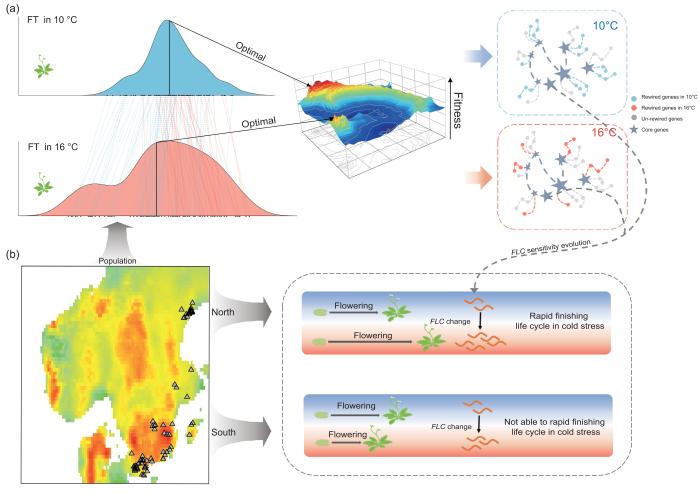
Links
Progress in dissecting the genetic basis of cold-induced early flowering from Institute of Tobacco Research
Recently, researchers from Institute of Tobacco Research, Chinese Academy of Agricultural Sciences (TRI, CAAS), made progress in dissecting the genetic mechanisms of cold-induced early flowering. The results were published as “Divergent Flowering Time Responses to Increasing Temperatures Are Associated With Transcriptome Plasticity and Epigenetic Modification Differences at FLC Promoter Region of Arabidopsis thaliana” in Molecular Ecology.
Phenotypic Plasticity refers to the phenomenon where individuals of different genotypes respond differently to the same environmental change. For example, low temperatures can induce early flowering in some crop varieties, leading to large-scale yield reductions, while the flowering time in other varieties remains unchanged, and some varieties even experience a delayed flowering time. Understanding the genetic, and transcriptomic changes that drive the phenotypic plasticity of fitness traits is a central question in evolutionary biology. In this study, we utilised 152 natural Swedish Arabidopsis thaliana accessions with re-sequenced genomes, transcriptomes and methylomes and measured flowering times (FTs) under two temperature conditions (10°C and 16°C) to address this question. We revealed that the northern accessions exhibited advanced flowering in response to decreased temperature, whereas the southern accessions delayed their flowering, indicating a divergent flowering response. This contrast in flowering responses was associated with the isothermality of their native ranges, which potentially enables the northern accessions to complete their life cycle more rapidly in years with shorter growth seasons. At the transcriptome level, we observed extensive rewiring of gene co-expression networks, with the expression of 25 core genes being associated with the mean FT and its plastic variation. Notably, variations in FLC expression sensitivity between northern and southern accessions were found to be associated with the divergence FT response. Further analysis suggests that FLC expression sensitivity is associated with differences in CG, CHG and CHH methylation at the promoter region. Overall, our study revealed the association between transcriptome plasticity and flowering time plasticity among different accessions, providing evidence for its relevance in ecological adaptation. These findings offer deeper insights into the genetics of rapid responses to environmental changes and ecological adaptation.
This research was supported by the National Natural Science Foundation of China, the National Key R&D Program, the Taishan Scholar Talent Project of Shandong Province, the Overseas Excellent Youth Science Fund of Shandong Province, and the Chinese Academy of Agricultural Sciences' Science and Technology Innovation Project.

Link to publication: https://onlinelibrary.wiley.com/doi/10.1111/mec.17544